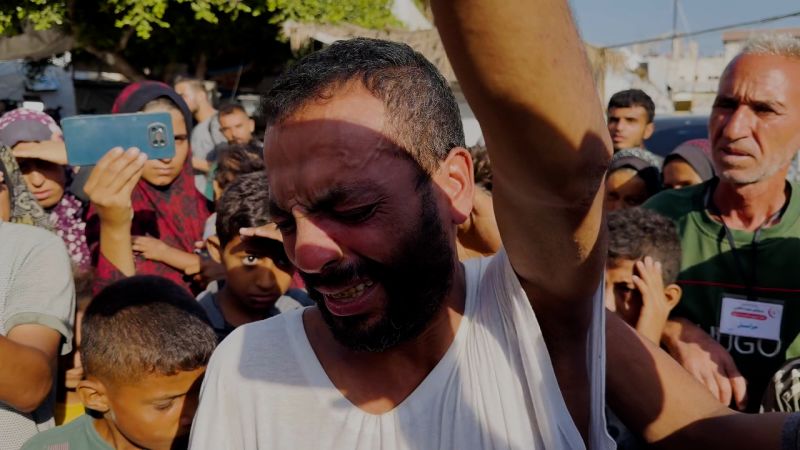The head of Gaza’s largest hospital has claimed he was repeatedly tortured during his seven months in Israeli detention, following his sudden release Monday, in a move that highlighted growing rifts in the Israeli establishment.
Dr. Mohammed Abu Salmiya, the director of the Al-Shifa medical complex, who was arrested in late November during the first of two Israeli raids on the facility in Gaza City, was released along with 50 other Palestinian detainees.
Their release has sparked outcry in Israel and was criticized across the political spectrum, as well as by families of the Israeli hostages kidnapped by Hamas during its deadly October 7 attack.
At a news conference Monday, Abu Salmiya alleged Palestinian detainees suffered “severe torture” and had medical treatment denied.
“My little finger was broken. I was repeatedly subjected to hitting on the head, causing bleeding multiple times. There was almost daily torture in the Israeli prisons,” he told reporters.
“The doctor there beats the detainees, and the nurse beats the detainees. This is in violation of all international laws.”
Abu Salmiya said fellow prisoners lost a significant amount of weight and were “completely denied treatment.”
“They amputated the feet of several prisoners, those who are suffering from diabetes symptoms due to the lack of medical treatment for them,” he said.
A prison service spokesperson said, “prisoners and detainees have the right to file a complaint that will be fully examined and addressed by official authorities.”
Abu Salmiya was reportedly detained while evacuating the hospital with a World Health Organization convoy. The Israeli military said at the time the director was “apprehended and transferred for … questioning following evidence showing that the Shifa Hospital, under his direct management, served as a Hamas command and control center.”
Al-Shifa became a flashpoint in Israel’s war against Hamas in Gaza and now lies in ruins following a 14-day Israeli siege in March. Israel repeatedly claimed that a Hamas command center sat underneath the medical complex and that the militant group has used it to hold hostages. Hamas has denied the claims, as have health officials working there.
Other Palestinian detainees released on Monday described overcrowded detention centers where prisoners were abused, diseases were rife, and food was scarce.
“They would show us photos of our relatives’ bodies, pictures of our families and children … and say: ‘Look at your children, we killed them.’ They would show us pictures of our wives, our sisters, and tell us that they had taken them and done this and that to them,” Faraj said.
Israeli outcry
The release has created tensions within Israel as its war with Hamas stretches into its ninth month, with Prime Minister Benjamin Netanyahu ordering an “immediate inquiry into the matter,” according to his office.
Netanyahu said the decision followed discussions at the High Court, and the identity of the released prisoners was determined independently by security officials “based on their professional considerations.”
Israel’s domestic intelligence agency Shin Bet said in a statement that detainees who posed a “lesser danger” were released to “free up places of confinement.”
Shin Bet said it had been warning for about a year of the need to increase the number of spaces in detention centers “given the need to arrest terrorists” in the West Bank and Gaza.
“Without a choice, without an immediate solution to the prison shortage, arrests will continue to be canceled and detainees will continue to be released,” the agency said.
But far-right National Security Minister Itamar Ben Gvir was among those outraged by the decision, calling the release of Abu Salmiya and other prisoners “security negligence.”
Former defense minister Benny Gantz, who resigned from Israel’s War Cabinet last month, said “whoever made this decision lacked judgment and should be fired today.”
The decision to release the detainees comes as families of Israelis taken hostage by Hamas during the October 7 attacks continue to wait for news of their loved ones. As many as 120 hostages remain captive in Gaza.
In a statement Monday, the Hostage and Missing Families Forum headquarters said it hoped the Israeli government would be “determined to release our family members, with the same determination as it releases the director of Shifa Hospital.”
